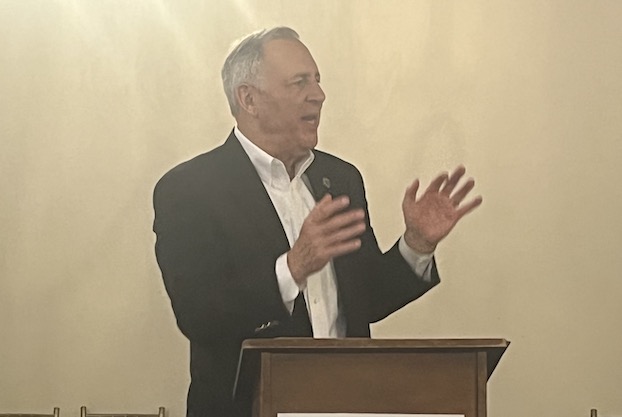Jim Beam column:Quotes are encouraging words
Published 7:35 am Thursday, October 28, 2021

- Josh Billings headlines a roundup of quotes from famous Americans that are encouraging words. quotesgram.com
“It is better to know less than to know so much that ain’t so.”
If there was ever a quote that best describes the current state of this country’s social media, that’s it. And Josh Billings, who said it in 1885, had no idea what was coming from Facebook and others like it over 100 years later.
Billings was the pen name of 19th Century American humorist Henry Wheeler Shaw (1818-1885). He has often been compared to Mark Twain.
Trending
How about this one by Rutherford B. Hayes in 1877 that is sound advice for today’s Republican and Democratic party members: “He serves his party best who serves the country best.”
Hayes was the 19th president of the United States. The Electoral College gave him the presidency in 1877 after one of the most contentious elections in the nation’s history.
Then, there is this one from Thomas R. Marshall — “Once there were two brothers. One ran away to sea, the other was elected vice president, and nothing was ever heard of either of them again.”
Marshall was the 28th vice president from 1913 to 1921 under President Woodrow Wilson. Marshall was known for his wit and humor, and another of his famous quotes came during a Senate debate about what the country needed — “What this country needs is a really good five-cent cigar,” he said.
President Calvin Coolidge clearly had veterans in mind when he said, “The nation which forgets its defenders will be itself forgotten.”
Coolidge was the country’s 30th president from 1923 to 1929 who said very little and received the nickname “Silent Cal.” He became president after the sudden death of President Warren G. Harding in 1923.
Trending
Coolidge decided against running for another term in 1928. He said, “We draw our presidents from the people. It is a wholesome thing for them to return to the people. I came from them. I wish to be one of them again.”
Henry Ford in 1929 said, “Thinking is the hardest work there is, which is the probable reason why so few engage in it.”
Ford’s introduction of the Ford Model T revolutionized transportation in America, and is credited with “Fordism,” the mass production of inexpensive goods coupled with high wages for workers.
Herbert Hoover, our 31st president who is remembered for the Great Depression, was apparently trying to instill some confidence in the American people when in 1931 he said, “Prosperity is just around the corner.” It didn’t happen, of course.
President Franklin D. Roosevelt (FDR) came along in 1933 and offered two quotations aimed at encouraging all Americans that things were going to get better. “The only thing we have to fear is fear itself,” and, “This generation of Americans has a rendezvous with destiny.”
Alfred E. Smith in 1933 had more encouraging words when he said, “All the ills of democracy can be cured by more democracy.”
Smith served four terms as governor of New York and was the Democratic Party’s unsuccessful candidate for president in 1928. He was the first Roman Catholic to be nominated for president of the United States by a major party.
FDR had more encouraging words in 1943 when he said, “The state of this nation is good — the heart of this nation is sound — the spirit of this nation is strong — the faith of this nation is eternal.”
Gen. Dwight D. Eisenhower in 1944 told the troops before the invasion of Normandy in World War II, “The eyes of the world are upon you. The hopes and prayers of liberty-loving people everywhere march with you.”
Eisenhower became the 34th president in 1953 and had some advice for all Americans — “A people that values its privileges above its principles soon loses both.”
Many of today’s politicians haven’t lived up to what President Harry S. Truman said in 1950 — “Our country stands before the world as an example of how free men, under God, can build a community of neighbors, working together for the good of all.”
Americans and their politicians haven’t worked together for quite some time now. It’s no longer, “One for all, all for one.” Truman had another quote worth repeating — “It is amazing what you can accomplish if you do not care who gets the credit.”
Perhaps the best way to end this quote-loaded commentary is with another Truman quote — “Good morning, and in case I don’t see ya, good afternoon, good evening, and good night!”





